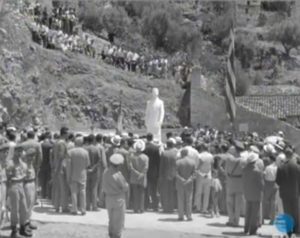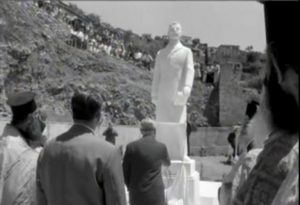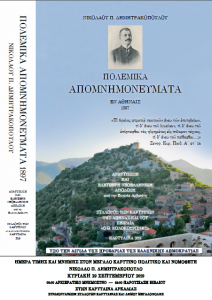“Nikolaos Dimitrakopoulos pointed out one of the most important problems of the Justice system, which is still not fully addressed and still creates problems to its functioning. This is the problem of too much slowness in the administration of justice”, said the Greek President Prokopis Pavlopoulos, in Karytaina, as part of a commemoration event for the great legislator Nikolaos Dimitrakopoulos.
The President of the Republic said to the citizens who had gathered that they should be proud “of the noble child of Karytaina”. In his speech he sent messages about the legal protection of workers and the independence of judges.
Watch the entire speech of the President of the Republic Prokopis Pavlopoulos:
He underlined that “I have a self-evident debt, and in my capacity as President of the Republic, to dwell once again on the institutional and political reservations left by Nikolaos Dimitrakopoulos on the need to respect the Independence of Justice. The work of Nikolaos Dimitrakopoulos must inspire and guide us today”.

(The President of the Republic Mr. Prokopis Pavlopoulos and the panel of the event. From left, Dr. George Adamopoulos, Ioannis Antonopoulos, Elias Nikoloulis, Dionysis Papadopoulos and Eugenia Arvanitis, the professor who edited the book and its edition in Modern Greek.)
The event, besides the President of the Republic, was also attended by Metropolitan Gortynos and Metropolitan of Megalopolis Ieremias, Vice-Speaker of the Parliament Odysseas Constantinopoulos, Minister of Agricultural Development Mr. Makis Voridis, Secretary General of the Ministry of Justice, Mr. Panos Alexandris, the Member of Parliament from Arcadia G. Papailiou, the Mayor of Megalopolis, Mr. Christogiannopoulos, the mayor of Ilion Mr. Zanetos, representatives of the Armed Forces and people from all over the area.
The regional governor Panagiotis Nikas in a statement urged that studies be immediately submitted to the Region to finance the restoration work on the entrance to the castle, which is in danger to collapse as well as the reconstruction of the highway to the mainland, which he described as dangerous, to be ready for events marking the 200th anniversary of the Revolution of 1821.
The event was organized under the auspices of the Presidency of the Republic by the Municipality of Megalopolis, the Karitainan Association of Athens and Piraeus “Theodoros Kolokotronis” and the Cultural Association “Common of Caritainans” in the village square next to his statue.
Lawyer and parliamentarian, cosmopolitan and man of letters, one of the most prominent men that were born in the modern Greek state, he was born in 1864 in Karytaina, Gortynia, the home-village of Theodore Kolokotronis, hero of the Greek Revolution of 1821. He is considered the most important legislator after Moueiris, a Greek lawmaker, a genuine visionary acknowledged by his political opponents.
Nikolaos Dimitrakopoulos was distinguished in the Parliament as an amazing orator, which led Eleftherios Venizelos to entrust him with the crucial portfolio of the Ministry of Justice, in which he excelled in upgrading the judiciary system and securing its proper functioning and restoration of justice.

Nikolaos Dimitrakopoulos was distinguished on the one hand as a patriot, who has rightfully taken his place in the History of the Modern Greek State, in particular for his rare political morality and his emblematic institutional offer. On the other hand – and in particular in its field, lato sensu, politics – as an inspiring Lawmaker and Legislator, who in less than two years, as Minister of the first Venizelos Government, managed to produce legislative work that is rightly compared with that of George – Ludovic von Maurer. It is precisely in this aspect of Nicolas Dimitrakopoulos’ personality that I am allowed to concentrate, essentially, on the rest of my brief speech.
Deeply educated and multi-talented, already in his early youth, Nikolaos Dimitrakopoulos manifested his, almost innate, inclination to the Legal Science.

It should be emphasized that in the course of his legal career he carried out his duties with full awareness that the lawyer, always defending his client’s legitimate interests, must perform his duties above everything else as a collaborator to Justice.
As a lawyer, Nikolaos Dimitrakopoulos was distinguished, in the field of Private Law, for both his handling of cases in the Court of Justice – providing an excellent example of a jurist rhetoric – and at an advisory level. After all, his opinions and his other studies have remained valuable – even for today’s legal scientific data – in a legal repository, through the four volumes of “Legal Practices”, published in 1912.
Law, under the conditions set out above, was Nicolas Dimitrakopoulos’ most appropriate “passport” for his later political career, which began very early.
His legal reputation and his widespread social prominence have, as I have pointed out, attracted the interest of leading representatives of the political world of the time.
It is characteristic of Nicolas Dimitrakopoulos’ exemplary morality that he refused to participate as a member of the then Governments before being elected a Member of Parliament. This is because, as a consistent Parliamentary Politician, he considered that the function of the Member of the Government, and therefore of the Minister, was to have the status of a Member of Parliament, both institutionally and politically, through the direct election by the People.
Indeed, it was only after his election as a Member of Parliament in the elections of 8 August 1910 that he accepted to participate, as Minister of Justice, in the first Government of Eleftherios Venizelos, from 6 October 1910. It was subsequently proven that his contribution as Minister of Justice, was unique and decisive in the legislative work of the first government of Eleftherios Venizelos. This is strongly supported by the fact that, as I have already said, the legislative work of Nikolaos Dimitrakopoulos was completed in less than two years.
From now on, I shall confine myself – as far as possible to the small time available to me for such a large and wide institutional undertaking – to describe, of course in general terms, the great stations of his legislative work.

1. First, however, I must remind – in order to show sufficiently the extent of his integrated legal personality – that, as soon as he assumed his post as Minister of Justice, Nikolaos Dimitrakopoulos had circulated to all State Bodies, through which he set out the aims of his legislative work, describing, at the same time, in dark colors the great problems of the Greek State at that time: Bureaucracy, corruption, lack of balance in the exercise of the Fundamental Human Rights and particularly blatant disrespect of the Independence of Judges, both personal and functional.
2. It is worth emphasizing here that in this paper he circulated, Nikolaos Dimitrakopoulos pointed out one of the most important problems of Justice, which is still not fully addressed. This is the problem of too much slowness in the administration of justice, which, according to Nikolaos Dimitrakopoulos, has led, on a large scale, to the ever-increasing disgusting and highly corrosive cases for the validity of justice.
In this regard, Nikolaos Dimitrakopoulos points out in his important study of “Justice in Greece” (1915): “[…] That which is a universal disease of ours and which is a self-denying all justice, is the sluggish, with to which it is bestowed. […] It takes years and decades to complete the civil cases. The costs are colossal and not rarely they exceed the subject of litigation. Delay and prolongation of the lawsuit, sometimes even painful for both the winner and the loser. In this way, the lawsuit and whatever the outcome of it, completely eliminates its intended purpose under the conditions under which it is conducted”.
It is also worth mentioning, in order to fully demonstrate the insight and depth of Nicholas Dimitrakopoulos’ political thought, that he was perhaps the first to diagnose the causal link between the quality and timely delivery of Justice and Financial Development. He points out, in this regard, on the “Economic Significance of Judicial Restoration” (1915): “But it may not have been sufficiently understood, at least, that … the basis and foundations of financial compensation is judicial redress. And that without a legal remedy, the chimera must be regarded as the intended financial redress.

Those who have been closely examining the influence it exerts on trade are the key victims of slow-moving and sometimes incomplete administration of civil justice; public security; those who have studied the terms, conditions, causes and effects of immigration; those who have compared the budgets and accounts of the state and the bridging gaps between them, many times the budgeted revenue from the ascertained, and thus from the revenue received, does not doubt that the improvement of the finances of the State, of public finances […] is impossible without judicial redress”.
Nikolaos Dimitrakopoulos’ legislative work has moved on two, essentially, axes, without in any way having the right to downgrade and undermine many of his other, in all 50 of his laws: First, that of defense social cohesion and the social fabric, through the institutionalization of the clutches of a pioneering for the time of Social Rule of Law, mainly through the introduction of adequate safeguards for the exercise of crucial Social Rights. And, secondly, that of the organization of a modern Judiciary, through the establishment of sufficient guarantees of respect for the personal and functional independence of Judicial Officers. At this point, and for the completeness of the analysis, I must point out that much of the success of this legislative work by Nicolas Dimitrakopoulos is due to the fact that he had previously prepared the ground, even at constitutional level, and in particular his constitution of 1911. Indeed, Nikolaos Dimitrakopoulos played an important role in the Review, which led to the final drafting of the 1911 Constitution, incorporating in it relevant provisions – general principles for both the State as well as the Judiciary, so Justice. In addition, Nikolaos Dimitrakopoulos stood by the side of Eleftherios Venizelos, literally, in order for the 1910 Parliament to become a Review, not a Constitutional one, as many at the time demanded.
With regard to the legislative work of Nikolaos Dimitrakopoulos which, as already discussed, relates to social cohesion and the social fabric, and therefore to the Rule of Law, the following laws are worthy of special mention:
1. The 1911 Law on Conventional Interest & loan-sharks”, through which, for the first time, solid foundations were set up with a view to combating, and retroactively, any form of profiteering in inter-individual trade.

Regarding the legislative work of Nikolaos Dimitrakopoulos, which, as already mentioned, relates to the organization and functioning of Justice, the following six laws, which were passed in just one year in 1911, are worthy of special mention too:
1. Above all, the law respecting, in particular, the independence of the judiciary and, in particular, the personal and functional independence of judicial officers. Of particular importance under this law is the establishment, for the first time, of the Supreme Judicial Council, whose jurisdiction was focused on protecting Judicial Officers from outside interference in the exercise of their judicial functions, and in particular on their meritocratic treatment during route of the cursus honorum, which determines their career path to the top of Justice.
2 Second, the four laws, which, in essence, set the new procedural framework for the settlement of private dispute law. These are laws which have, as a result, led to the adoption of an integrated Code of Civil Procedure, which modernized the relevant legislation of George-Ludwig von Maurer. And it is only this multi-pronged legislative initiative by Nikolaos Dimitrakopoulos that is sufficient to substantiate the validity of the comparison, which has been discussed before, that puts him, in terms of institutional offerings, at almost the same level as George-Ludwig von Maurer.

3. Third, the Law on Lawyers. This is essentially the first ‘Code of Lawyers’, which laid the foundations for the exercise of the Law on Conditions, under which the Lawyer, without failing to disregard the legal interests of his client, must act as his Associate Lawyer. Above all, it respects the Independence of Justice and Judicial Officers, both personal and functional.
I close this brief reference to the great personality of Nikolaos Dimitrakopoulos by re-paying the tribute due to this patriot and inspiring Legislator. And I have a self-evident debt, and in my capacity as President of the Republic, to dwell once again on the institutional and political reservations left by Nikolaos Dimitrakopoulos on the need to respect the Independence of Justice.
The work of Nikolaos Dimitrakopoulos must inspire and guide us today. If I have to choose among the aforementioned legacies of Nikolaos Dimitrakopoulos, which appear more compelling, without hesitation, I stand out: First, the assurance of full respect for the personal and functional independence of the Judicial Officers.
And, secondly, the legacy of the timely and effective administration of Justice so as to eliminate the phenomenon of slowness and negligence. A phenomenon that corrupts, in a corrosive way, the trust in the task of the Judicial Officers, and thus its trust in the Rule of Law.
Let’s not forget, moreover, that Fair Trial, enshrined in national, European and international law, is at the heart of our entire legal culture”.
Ask me anything
Explore related questions





